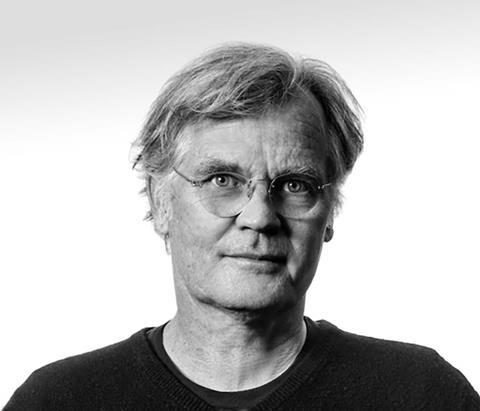
Lars Blomgren sits atop one of the largest drama slates in the world. Production giant Banijay, where he is head of scripted, is home to 50 scripted labels in 19 territories. These include Sweden’s Yellow Bird, the maker of crime drama Young Wallander; Banijay Studios France, the producer of costume epics Versailles and Marie Antoinette; and UK labels Kudos, behind upcoming BBC1 drama Rogue Heroes, and Tiger Aspect, home to global hit Peaky Blinders.
Between them, Banijay labels were in production on an astonishing 138 scripted projects last year. All this makes Blomgren well positioned to provide a global perspective on the TV drama market — one that is enjoying record levels of production but negotiating the cost of galloping inflation and a possible slowdown in streamer commissioning.
Blomgren was previously head of scripted, EMEA, at Endemol Shine Group before Banijay took over the company in a $2.2bn deal in 2020. Before that, he headed Endemol Shine-owned Swedish producer Filmlance, where he helped bring to the screen hit Nordic noirs such as The Bridge and Beck. Speaking over Zoom from his home office in Sweden, Blomgren describes his role as helping to encourage collaboration and knowledge exchange between Banijay’s 50 labels “to maximise their value of being in a group”.
He stresses that Banijay is a producer-driven organisation, populated by “strong independent companies” with their own priorities. But he clearly thinks the companies can better face the challenges of the scripted landscape as part of a larger group. Practical support comes via initiatives such as Banijay’s scripted fund, which helps producers to “step out of their comfort zones” if they need to invest in significant IP or talent deals (Blomgren declines to say how large the fund is).
Best known for its non-scripted formats such as Big Brother, MasterChef, Survivor and Deal Or No Deal, Banijay has doubled down on scripted this year. The group has partnered with leading French producer Alain Goldman, whose credits include Sacha Baron Cohen-starrer The Spy, as well as Spanish director and producer Alex de la Iglesia’s Pokeepsie Films, maker of mystery horror 30 Coins, and Italian scripted producer Groenlandia Group, behind sword-and-sandals series Romulus.
Talking to Blomgren, it is clear Europe is a key focus for Banijay. As a French group, France is naturally a priority, and it also has a major presence in the UK. But its reach stretches from Germany to India, Mexico to New Zealand; Spain is also a major focus.
“We’re looking a lot at the Hispanic world,” says Blomgren, referring to the ability of Spanish-language projects to travel between Spain, Latin America and the US Hispanic market. He notes Warner Bros Discovery’s recent decision to maintain original production for HBO Max in Spain (and France), despite cutting back elsewhere in Europe, as a sign of how important the Spanish market is to major content groups. “This is an area we would love to use the [scripted] fund as much as possible to create more evolved propositions,” he says.
India is also an important market for Banijay, not only for its size but because locally produced content is vital for success. Banijay has produced remakes of shows such as Call My Agent! for Netflix’s Indian audiences through Banijay Asia.

Noir bright spot
Asked about international drama trends, Blomgren cites a resurgence in demand for Nordic noir. Filmlance’s Swedish crime dramas The Sandhamn Murders and Beck are both performing strongly, as is non‑Banijay Danish drama The Chestnut Man for Netflix. The latter, he says, “is a very traditional Nordic noir — it’s almost like stepping back 10 years”. He feels the genre is returning to basics after having ramped up the gore in recent years.
The “horror series is coming back” too, asserts Blomgren, citing the success of Pokeepsie’s 30 Coins — the company’s co-founders de la Iglesia and Carolina Bang have a “wild approach to projects, which works very well”.
The drama market itself is changing too, believes Blomgren, with the streamers evaluating their first batch of non-English-language shows and working out which are driving subscriptions — and which are not. “They’re kind of hesitant right now. We don’t know what’s going on. There is lots of uncertainty in the business.”
Warner Bros Discovery’s decision to save money by ceasing HBO Max original programming efforts in the Nordics and Central Europe, and halting development in Turkey and the Netherlands, is emblematic of this uncertainty. But it is noticeable at all the streamers. The demands of subscribers have, until recently, driven streamer commissioning strategy, says Blomgren. But that is not necessarily the case now. With their stock-market prices falling, streamers are more cautious about spending money and are increasingly mindful of the need to satisfy investors.
Warner Bros’ decision to cancel HBO Max feature Batgirl, he says, “was not primarily to give a statement for the creative community — it was more for the stock market”.
In Blomgren’s view, the industry is moving into a more mature, risk-averse era as a result, and established directors and production companies with a track record of delivery are likely to benefit. “In uncertain times, you go for the safest bet,” he says.
He also thinks that for streamers, the quality of scripted programming will become more important than volume or the number of series on offer. “Growth is important, but it’s also a matter of keeping your subscribers. And you’ll only keep your subscribers if the completion rate goes up — if they actually finish [series].”
Blomgren stresses that co-producing for traditional broadcasters remains important for Banijay. Retaining IP as much as possible is a key strategy for the Paris-based firm. Its multi-genre catalogue contains more than 120,000 hours of original programming, sold by inhouse distribution arm Banijay Rights.
Broadcaster renaissance
Traditional broadcasters “are going to be even more important now that the streamers have hit a bump in the road”, says Blomgren. But it remains a major challenge to fully fund broadcaster co-productions in this climate of on- and off-screen talent inflation. “The final 10%-15% is very hard to reach,” he says.
Blomgren says Banijay can help its labels evaluate the “optimal buyer” for a project. Both the streamers and broadcasters have “vulnerable models”, he notes. “It’s a big challenge to decide on the right partner — it’s extremely complicated.”
Many of Banijay’s partners — such as Pokeepsie, Groenlandia and Alain Goldman — produce movies. “There’s so much talent in that part of the industry, and we want to be able to work with them in features — and TV as well,” says Blomgren.
But scripted TV is the priority. “We are not primarily a feature film company,” he says, referring to a “clear migration all over the world of talented feature film people into TV”. Film is also a very challenged industry, especially in Europe: “The signs are clear that indie movies are struggling — it’s more about the Marvels and the very big titles.” Banijay, he believes, can help film producers “broaden their scope” without letting go of film. Pokeepsie, for example, is talking to Banijay’s UK labels about possible drama co-productions.
For Blomgren, this is another example of how a big production group can help labels weather the changing environment of the scripted industry. “Banijay is well prepared for the challenges we have now,” he says. “I feel quite comfortable with us being able to handle all the changes in the business.”
Spotlight: Upcoming Banijay dramas

Banijay’s scripted slate includes upcoming Canal+ historical drama Marie Antoinette. Created and written by The Favourite screenwriter Deborah Davis, the biopic stars Emilia Schüle (Ku’damm 56) as the young queen navigating “the dark, manipulative and misogynistic world of Versailles”. It is co-produced by Banijay Studios France, which made Versailles, with Capa Drama and Les Gens. Marie Antoinette pre-sold last year to BBC2 for the UK.
Rogue Heroes — a dramatised account about the formation of the SAS special forces unit — is created by Peaky Blinders’ Steven Knight, and produced by Kudos and Nebulastar for BBC1. Based on Ben Macintyre’s bestselling book of the same name, Rogue Heroes has gone to US network Epix, Canal+ in France, HBO Max in Europe and Prime Video in Canada.
Banijay France scripted label Shine Fiction, which launched last year, has co-produced Serial Lover with Sibaro Films. The thriller, about a man who manipulates women, was ordered by French network M6 and premiered last month at La Rochelle’s Festival de La Fiction.
Shine Iberia, meanwhile, is co-producing biopic Bosé for Paramount Plus about the Spanish singer/songwriter Miguel Bosé, whose music has topped the charts across Latin America and in Spain.






![The Brightest SunScreen[Courtesy HKIFF]](https://d1nslcd7m2225b.cloudfront.net/Pictures/274x183/3/5/0/1448350_thebrightestsunscreencourtesyhkiff_312678.jpg)


















No comments yet